
IRIS login | Reed College home Volume 96, No. 2: June 2017
An Evening with Deresiewicz
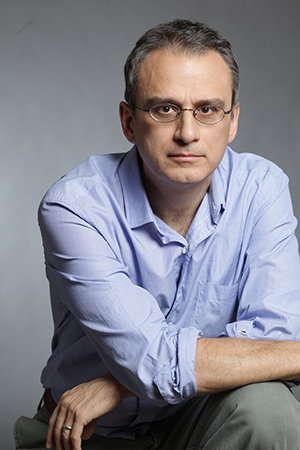
I had dinner with William Deresiewicz, author of Excellent Sheep: The Miseducation of the American Elite and the Way to a Meaningful Life, (along with a group of students) before his lecture at Reed last week and we had a lovely conversation. Nice guy, very smart, heart in the right place. Based upon his lecture and his article in the New Republic, “Don’t Send Your Kid to the Ivy League—The nation’s top colleges are turning our kids into zombies,” I have three bones to pick.
First, his lumping together Reed with Sewanee, Mt. Holyoke, Kenyon and Wesleyan is, without putting too fine a point on it, not very helpful. I think it shows a profound misunderstanding of Reed. When I mentioned this possibility to him, he didn’t seem especially interested. If one is thinking about models for how a truly serious and student-oriented undergraduate program ought to look, you’d think a serious engagement with Reed might be useful—perhaps even essential.
Second, I think he largely misses the point of Harvard, Yale, Princeton, and the others. Not that they need my defense, but his criticism seems at once true and irrelevant. I doubt that many people really believe those institutions exist to provide great undergraduate teaching. Rather, they exist primarily to create knowledge—e.g., Nobel Prize winners and their equivalents in other fields—and, as such, they play a crucial and essential role in society. As an institutional matter, that role is deeply incompatible with terrific undergraduate teaching (if nothing else, we at Reed work much too hard on our teaching to win Nobel prizes), but so what? If you’re an undergraduate at, say, Harvard, the benefits that you will reap in terms of prestige, contacts with other enormously talented people, occasional opportunities to rub elbows with and perhaps learn some things from one or two world-class scholars—these are hardly trivial. And if that’s what an undergraduate wants, who’s to argue? It wouldn’t be my choice, but Reed isn’t for everybody.
Continue reading An Evening with Deresiewicz
Stockroom Czar Goes out with a Bang
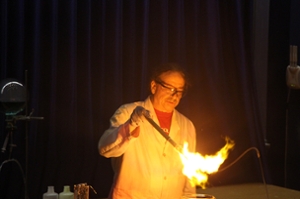
After 27 years at Reed, chemistry lab and stockroom manager Randie Dalziel is retiring. To mark the historic occasion, the chemistry department organized Randiefest 2k14, which gave him a chance to showcase some of his favorite chemical reactions—in other words, to make things go “boom.”
Randie awed the crowd in Vollum lecture hall by wielding a fiery wand (a wooden stick dipped in flaming liquid oxygen), a glow-in-the-dark fountain (a round flask filled with luminol, the luminescent chemical used at crime scenes), and finished up with a spectacular demonstration of a thermite reaction, which produced an incandescent blaze of fiery sparks on the steps of Vollum.
“One time I did this on black top,” Randie said. “After the reaction there was this strange smoke, and we found out that the thermite burned through to the black top and melted it.”
Continue reading Stockroom Czar Goes out with a Bang
Shades of White
The discredited science of eugenics served as inspiration for Shades of White, an installation by Prof. Geraldine Ondrizek [art 1994–] created for the Jordan Schnitzer Museum of Art at the University of Oregon. Prof. Ondrizek spent years researching the work of Alexandra Minna Stern, a medical historian at the University of Michigan and the author of Eugenic Nation: Faults and Frontiers of Better Breeding in Modern America.
Ondrizek’s investigation led to a visual reinterpretation of the “Gates Skin Color Charts” created by R. Ruggles Gates and used by eugenicists in the mid-20th century to assign an individual's racial category. Hand-dyed silk, displayed in 18-gauge steel boxes, approximates variations of skin pigmentation. “Her appropriation of this eugenic device to facilitate a discussion of human dignity is poignant and timely,” notes June Black, the museum’s associate curator.
Continue reading Shades of White
Reed Threepeats as Portland Bike Commute Challenge Winner
When it comes to bike commuting in Portland, Reed College and Wieden & Kennedy are the Montagues and Capulets, Red Sox and Yankees, Liverpool and Manchester United, or the Sharks and the Jets. Okay, you get the idea, we’re rivals. Over the past several years, the two organizations have finished at the top of the Portland Bike Commute Challenge leader board for large organizations. And this year, Reed logged more miles during the month of September than did our crosstown competitors.
The winner earns bragging rights for bike commuting supremacy in one of the most bike-friendly cities in the country. Thanks to a side bet by Reed’s co-organizers, Josh Shalek and Claire Michie, a worn pair of Reedie bike shorts will be framed, possibly spritzed with Old Spice, and hung in the hallways of one of the country’s most prestigious and successful ad firms.
The award celebration was held at Portland City Hall the evening of October 9. Reed was awarded a one-by-one-inch 2014 plaque to mount on the trophy it earned in 2010. This marks the third time (2010, 2011, and 2014) that Reed has taken the top prize—officially making it a bike-commuting dynasty!
Continue reading Reed Threepeats as Portland Bike Commute Challenge Winner
Reed Launches Lab of Linguistics [LoL]
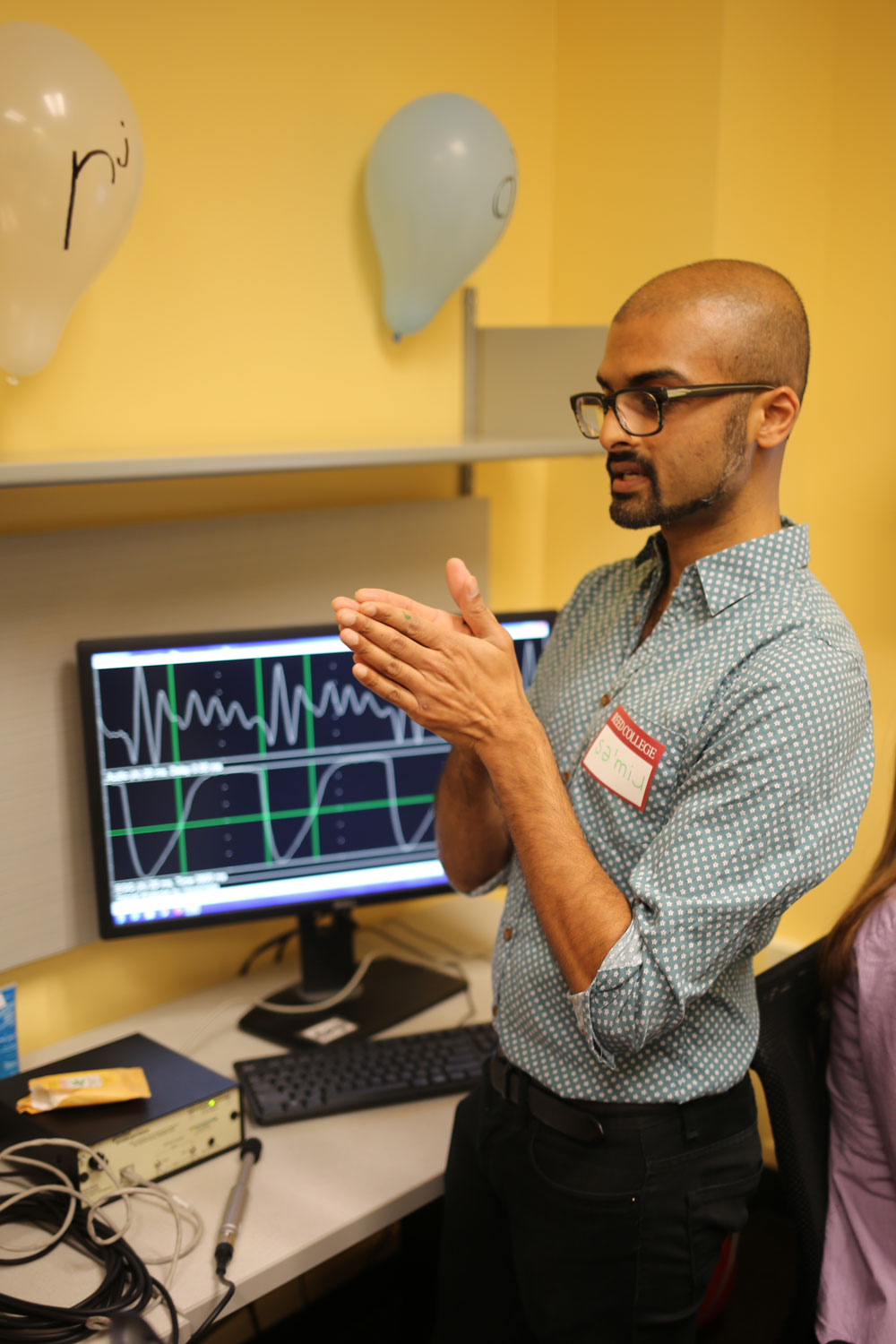
Say the following sentence out loud: “The cops caught the robber as he was sleeping on a small cot.”
Was there any difference in the way you pronounced the words caught and cot?
In some parts of the United States, such as New York City, speakers tend to distinguish the two. But in Boston and on the West Coast, speakers tend to pronounce them the same—a trend known to linguists as the low-back merger. Over centuries, the merger or migration of sounds can radically transform a language, as in the case of the Great Vowel Shift that rewired English in the Middle Ages.
Prof. Kara Becker [linguistics 2010–], an expert on accents and dialects, demonstrated the low-back merger and other sociolinguistic phenomena this week at an open house for Reed’s brand new Lab of Linguistics (LoL), which offers students better tools to study spoken language and gain insight into culture, society, and the structure of the human mind.
Continue reading Reed Launches Lab of Linguistics [LoL]
Reed Runners Demolish Portland Marathon
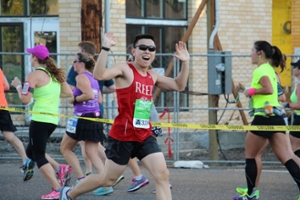
Approximately 45 students, staff, alumni, parents, and related life-forms ran in the Portland Marathon and Half-Marathon on Sunday in a vivid (and sweaty) demonstration of the versatility of a Reed education.
The first Reed runner to cross the Marathon finish line was physics major Will Holdhusen ’16 who posted a blazing 3:11:10, followed closely by history major John Young ’15 at 3:14:19 and psych major Corinna Jackson ’15 at 3:27:39.
Continue reading Reed Runners Demolish Portland Marathon
Neighbors Visit Reed, Live to Tell the Tale
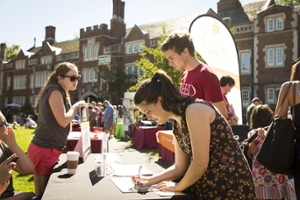
A performer sticking his head in balloons he’d inflated with a leaf blower. Children riding a tiny truck down a plastic slide. Cider. Bees. Bluegrass. A peek inside a nuclear reactor. These were just some of the attractions that drew multitudes of Portland neighbors to Reed on Saturday to celebrate the bond between town and gown.
The festivities kicked off with the Reed College 5K Run, which drew 276 participants and raised more than $9,000 for local Portland schools, including Duniway, Grout, Llewellyn, Lewis, and Woodstock Elementary schools. The overall winner was Christopher Clancy, who finished in 16:36, followed by physics major Jack Flowers ’15 who came in second in 17:15. Prof. Kyle Ormsby [math 2014-] came in fourth and Prof. Alison Crocker [physics 2014-] came in first among women runners and sixth overall. Trevor Soucy ’18, Ben Black ’18, Ki Choi ’17, Bookstore Manager Ueli Stadler, Hayden Kinney ’17, and Ross Petersen ’15 all finished in the top 25, several minutes ahead of President John Kroger and Reed magazine editor Chris Lydgate ’90, who ran while brandishing a ukulele. Afterwards, runners and their families tucked into a pancake feast in commons.
Continue reading Neighbors Visit Reed, Live to Tell the Tale
Reed Mourns Prof. Maggie Geselbracht
We are deeply saddened to share news of the death of Prof. Maggie Geselbracht, who passed away last evening, after having struggled for many years with non-Hodgkin's lymphoma and more recently with Epstein-Barr virus-driven large B-cell lymphoma.
Maggie was the John D. and Catherine T. MacArthur Professor of Chemistry, and she had taught at Reed since 1993. An inspiring teacher and mentor, she touched many Reed students' lives through her general and inorganic chemistry courses, as well as through her research. Maggie's energy and enthusiasm for life and for learning were evident in all her work. She will be deeply missed by her many students, her colleagues, her friends across the Reed community, and a national network of like-minded chemists. Maggie is survived by her husband, Tom, and two sons, Zach and Kieran.
We extend our deepest condolences to Maggie’s family and friends.
Continue reading Reed Mourns Prof. Maggie Geselbracht
Guesswork and the Rankings Game
U.S. News & World Report released the 30th annual edition of its influential “best colleges” rankings yesterday. You’ll find the usual suspects at the top of the list. Reed came in at the weirdly low Number 77.
To me, however, the biggest surprise was St. John’s College.
St. John’s, if you’re not familiar with it, is a wonderful college in Annapolis, Maryland. Founded in 1696, it boasts an incredible 8-1 student-faculty ratio and a “Great Books” curriculum that makes me drool.
Continue reading Guesswork and the Rankings Game
Inside Steam Tunnels, Students Make their Mark
More than 100 incoming students descended into Reed’s labyrinth of underground steam tunnels last week on a series of expeditions led by Gary Granger, director of community safety.
The tunnels are among the oldest structures on campus and were originally constructed to house the pipes that convey steam from the Physical Plant to heat Reed's first buildings, including Eliot Hall and the Old Dorm Block. They are sometimes muddy, sometimes dusty, often difficult to navigate, and always mysterious.
Over the years, intrepid Reedies have found ways to lull the sentries, bypass the locks, and explore the subterranean passageways, leaving behind surreal artwork, mordant graffiti ("Simeon Reed's Country Club"), and the occasional garden gnome.
Continue reading Inside Steam Tunnels, Students Make their Mark
Pantheon Returns, Fully Clad

As dawn’s rosy fingers hid behind the morning clouds, droves of freshlings on their way to their first Hum lecture encountered a spectacle wondrous to behold—a fully clad Pantheon of Olympian gods and goddesses greeting them on the steps of Vollum.
“Welcome!” cried the immortals. “You’re a Reedie now!”
The Pantheon is a light-hearted student tradition that celebrates Humanities 110, Reed’s signature multidisciplinary course which starts with the Epic of Gilgamesh and wends its way through the Code of Hammurabi, the Book of the Dead, Genesis, Exodus, the Book of Job, the Oresteia, the Iliad, Sappho, Herodotus, Thucydides, and Euripides (and that’s just the first semester!) The Gods welcome new students to the course and ask them to pour libations on the ground, re-enacting a Homeric custom.
Continue reading Pantheon Returns, Fully Clad
So, What Turns You On?
Beneath the deep arches of the white tent on the Great Lawn, 414 freshmen and their parents and friends rose as the faculty marched in stately procession Wednesday to mark Convocation 2014. President John Kroger welcomed the students of the class of 2018 and—noting that some in the class would take five years to graduate—the class of 2019. “And if you already think you may wind up in the class of 2020, please come see me after,” he added. Kroger spent the rest of his remarks distilling for parents and friends the experience of being a Reedie: Humanities 110, collaborative work with faculty and students, and Portland’s unique culture, which, according to Kroger, students would have no time for.
Professor Jay Dickson [English 1996–] gave the inaugural Humanities lecture, titled “Everything You Ever Wanted to Know: The Iliad and the Enkuklios Paideia.” Prof. Dickson’s lecture centered on the meaningfulness of Homer’s Iliad to a liberal arts education. Why, he asked, is Homer’s epic so important to a Reed education that all incoming freshmen are required to read it even before the first week’s classes? The poem’s vast array of stories and characters proved foundational to an ancient curriculum. Students would learn reading, writing, rhetoric, and other subjects by using the poem as a point of departure. Thus, just as the Iliad invited the ancients to extrapolate from Homer’s story into other fields of knowledge, so the epic encourages freshmen to do the work of critical extrapolation, the foundation of a Reed education.
Ivan Sutherland, visiting scientist at the Asynchronous Research Center at Portland State University, received the Vollum Award. Sutherland encouraged the freshmen to follow their academic interests by posing a single question: “So, what turns you on?”
Continue reading So, What Turns You On?
“Anyone Caught Lecturing will be Shot”
[Editor's Note: We were saddened to hear of the recent death of John Sperling ’48, one of Reed's most prominent alumni. Here's an article about John from 1995 that we stumbled across in our archives.]
John G. Sperling ’48 had it made.
He was a tenured professor with sterling academic credentials and a respectable, though sometimes rocky, career. In another decade or so, he’d be eligible for retirement. Then he could devote his time to writing and travel, opera, and theater.
Continue reading “Anyone Caught Lecturing will be Shot”
Reed mourns death of Prof. Melissa Schlachtmeyer
We are very sad to report the death of Assistant Professor Melissa Schlachtmeyer. Prof. Schlachtmeyer died in Italy on August 6 as a result of complications from breast cancer. Her husband, daughter, parents, and sister were by her side. She was 41 years old.
Schlachtmeyer joined the Reed theatre department in 2012 and was a beloved and valued teacher, mentor, colleague, designer, and friend. She was instrumental in developing the new costume shop and the current theatre curriculum. Read more about her broad-based career as a costume designer for opera, dance, and theatre.
“She was clearly a woman of great accomplishments and talent,” recalls Jay Dickson, professor of English & humanities, “I had looked forward to getting to know her better in the coming years, and I am so sad and shocked that now I won’t.”
Continue reading Reed mourns death of Prof. Melissa Schlachtmeyer
Remembering R.P. “Dick” Wollenberg
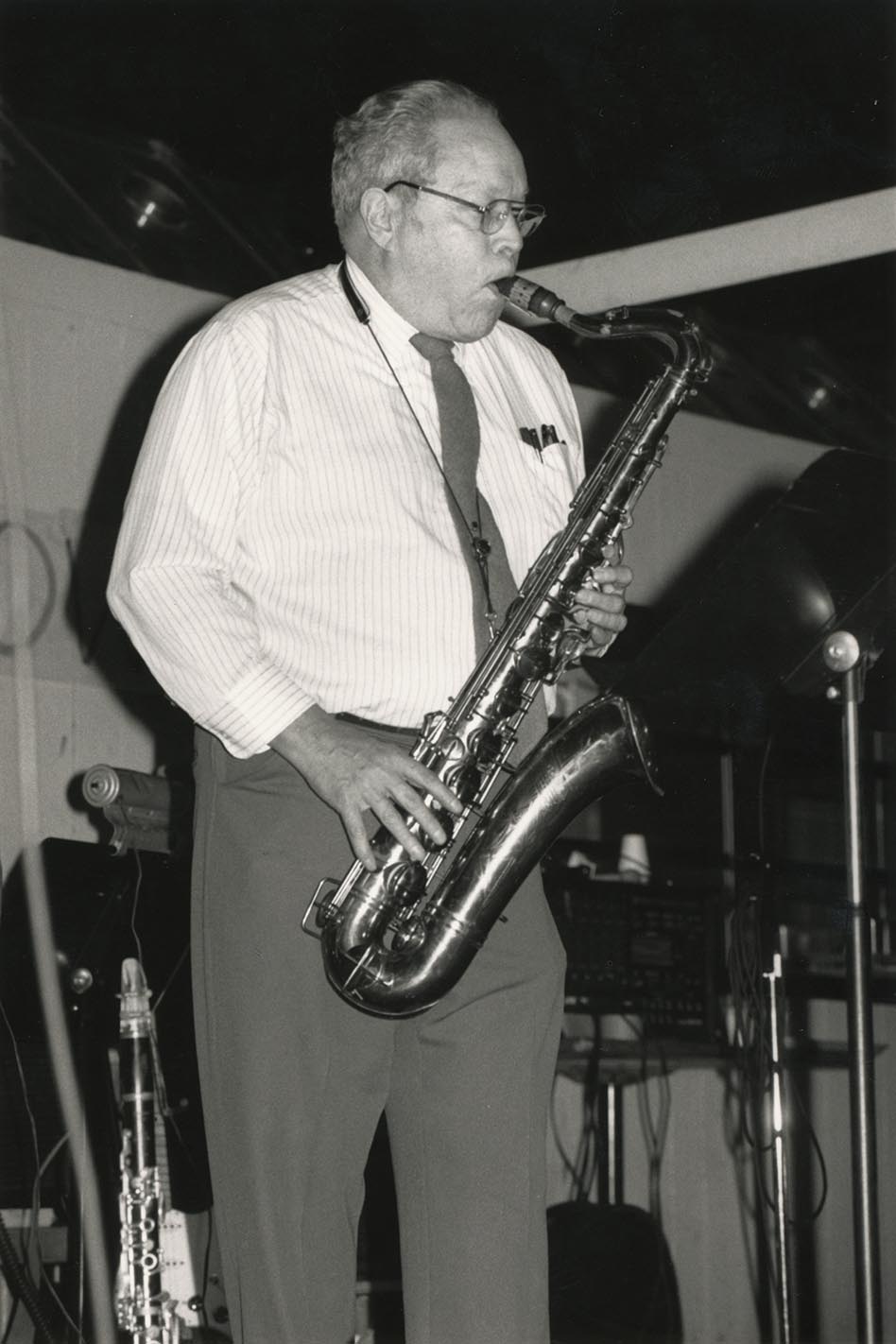
Emeritus Trustee Richard P. “Dick” Wollenberg died at his home in Longview, Washington, on July 2, 2014. He was 98.
“The Reed College community lost a great friend and benefactor,” says President John R. Kroger. “Through his generosity and leadership, he helped build the college into what it is today.”
Wollenberg served four decades on the Reed College board of trustees (1962–2005), inlcuding nine years as board chairman (1982–91).
He also chaired the board’s budget policy committee from its inception in 1992 until 2004. Projects launched with his support include the establishment of the president’s discretionary fund, the endowment of a professorship in economics in honor of professor George A. Hay [economics 1956–83], and the completion of several major science facilities projects.
Wollenberg’s influence ran deeper than any particular project, however. When he joined the board in 1962, the endowment was almost nonexistent. By 1972, it had reached $3 million, and by the time he left the board in 2005, the endowment was valued at $350 million. Today it is $538 million.
Continue reading Remembering R.P. “Dick” Wollenberg
Marketplace Spices Up Reunions 2014: Reedfayre
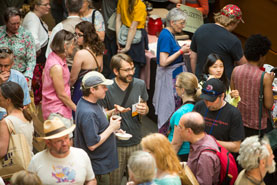
On Saturday afternoon of Reedfayre, the Performing Arts Building was abuzz with alumni, students, and families browsing the crafts, comics, cosmetics, and, most numerous of all, culinary creations, all cooked up by Reed alumni.
Always ready for a grand appearance, the Meat Smoke Crew greeted guests with enough pulled pork and brisket sandwiches to choke a Doyle Owl. Gigantic Brewing offered samples of its latest seasonal beers, including the Firebird smoked Hefeweizen, which founder Van Havig ’92 described as “like a peanut butter cup . . . two great things making one amazing thing.” Next door, Daniel Thomas ’89 served up delicious red and green tamales from his popular Portland restaurant Xico.
One of the most arresting displays belonged to Bob Combs ’90 of Combs Honey, whose table featured a transparent container filled with honeycomb—and live bees. Once drawn in by the bees, I couldn’t help but sample his blackberry honey and take home a couple slabs of honeycomb for myself.
Continue reading Marketplace Spices Up Reunions 2014: Reedfayre
Reed Math Prof Wins NSF Grant
Prof. Kyle Ormsby [mathematics 2014–], who is set to start his tenure-track position at Reed this fall, is already bringing in the accolades. In May, Reed received a $172,146 research grant from the National Science Foundation for a project under Ormsby’s direction. The project “Structure and computations in motivic and chromatic homotopy” begins in September and continues through August 2017.
If the title leaves you scratching your head, Ormsby explains that the grant will provide support for his study of “some pieces of mathematics that lie at the intersection of topology and algebraic geometry.” Algebraic geometry, as you undoubtedly know, “narrows the focus of geometry, only studying shapes that are defined by polynomial equations.” Topology is the study of geometric properties that are unchanged by the continuous deformation of figures. For example, topologists consider doughnuts and coffee cups to belong to the same class (single-holed objects) because one could be stretched to resemble another.
“If topology’s objects are made out of saltwater taffy,” says Ormsby, “then algebraic geometry’s objects are constructed from peanut brittle—far more rigid and inflexible.”
Continue reading Reed Math Prof Wins NSF Grant
Counting on You
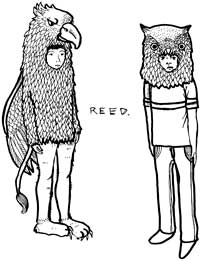
We’re in the final stretch.
Six days left in the fiscal year. Six days for the Annual Fund to reach its goal.
From time to time, alumni ask me what the Annual Fund actually supports. My answer: basically everything.
In the last year, for example, the Annual Fund helped Reed:
• welcome 356 new students to campus
• open a new Performing Arts Building
• hire 9 new professors from Harvard, Oxford, Yale, Cornell, and Stanford, among others
• license 22 students as nuclear reactor operators
• crown 321 scholars with thesis laurels
The Annual Fund’s dollar goal is an ambitious $4,084,000, a whopping number that is hard to wrap your head around. Just as important, however, is the goal for participation: 4,400 donors, out of a total pool of roughly 15,000 living alumni.
Continue reading Counting on You
Data Sheds Light on Alumni Giving
Figuring out why Reed alumni donate to the college may seem like a task for a psychic, but computational biologist Keith Allen ’83 is making strides armed with numbers and know-how.
A member of the Alumni Fundraising for Reed Committee, Allen has been exploring data on alumni giving for the past year. Presenting his findings at a Reunons 2014:Reedfayre Paideia class, “How Reedies Give: An Unapologetically Nerdy Exploration,” Allen showed the audience a new way of looking at (or looking for) alumni who give back to Reed.
The first lesson Allen’s exploration revealed is that consistency is king. Over the last five years, some 1,550 alumni made a gift to Reed every year. Contributions from that group account for a whopping $20 million—the lion’s share of the total amount given to the Annual Fund in that time.
Continue reading Data Sheds Light on Alumni Giving
How Reedies Helped Oregon Win the Freedom to Wed
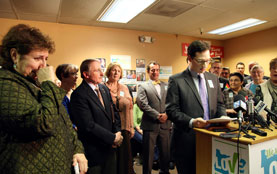
Some cheered. Others howled. A few were wearing go-go boots.
Together, we made up a crowd of 200 people. We were at the Oregon United for Marriage campaign headquarters in Portland, smashed inside a conference room too small to fit everyone. We listened to Misha Isaak ’04. He stood behind a podium, speaking to a swirl of television cameras, tape recorders, microphones, and notepads. It was noon on May 19. This was the historic moment we had been waiting for.
We had had won. A federal judge in Eugene had just struck down the Oregon law that excludes same-sex couples from marriage. Weddings started that afternoon. By that evening, hundreds of us were dancing in the streets of southeast Portland, joined by a marching band named LoveBomb Go-Go.
Continue reading How Reedies Helped Oregon Win the Freedom to Wed
< Prev 1 2 3 4 5 6 7 8 9 10 11 12 13 14 15 16 17 18 19 20 21 22 23 24 Next >


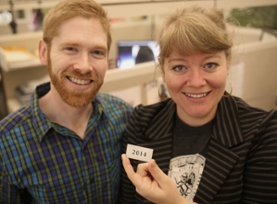

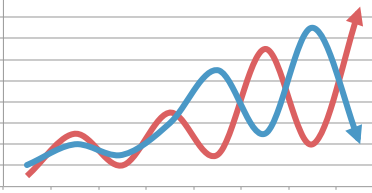
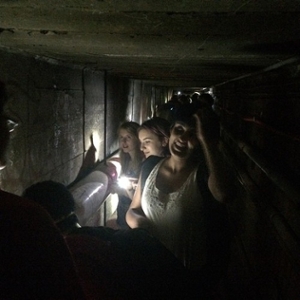
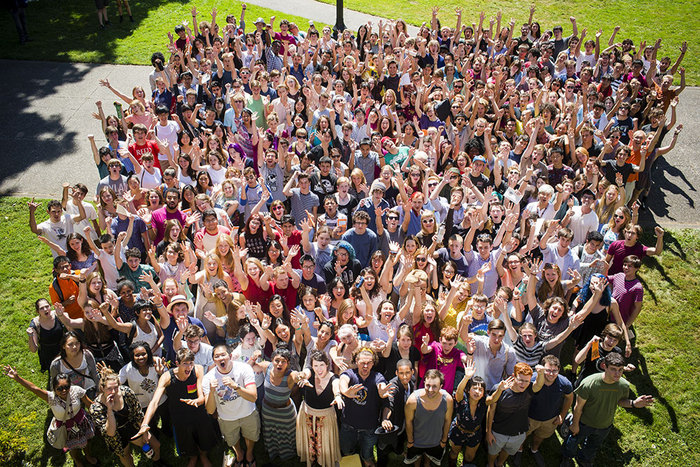
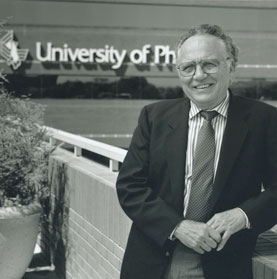
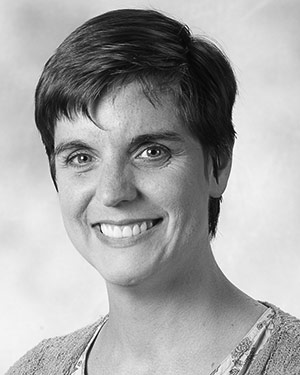
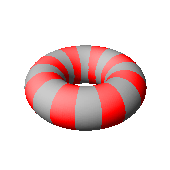
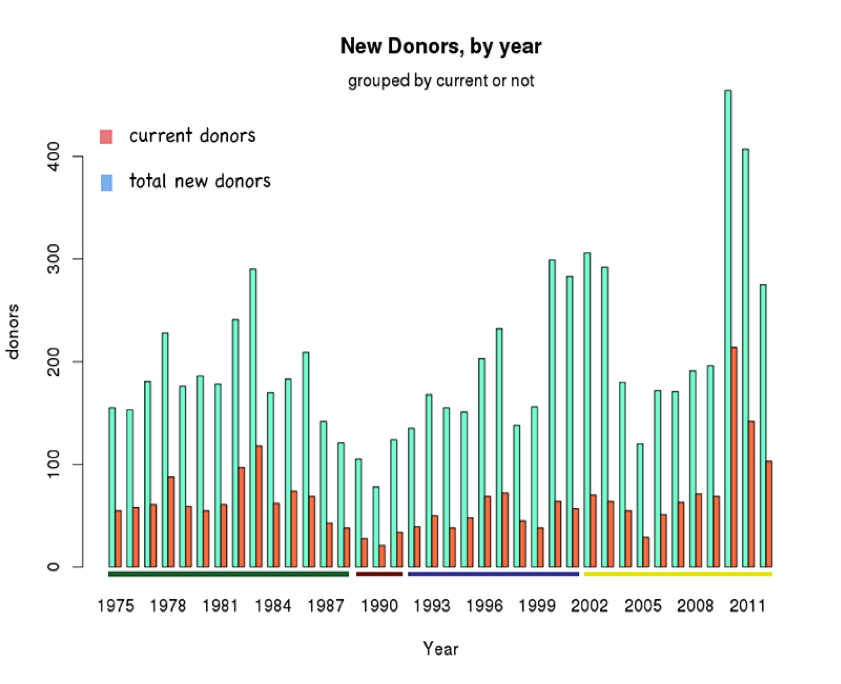

LATEST COMMENTS
steve-jobs-1976 I knew Steve Jobs when he was on the second floor of Quincy. (Fall...
Utnapishtim - 2 weeks ago
Prof. Mason Drukman [political science 1964–70] This is gold, pure gold. God bless, Prof. Drukman.
puredog - 1 month ago
virginia-davis-1965 Such a good friend & compatriot in the day of Satyricon...
czarchasm - 4 months ago
John Peara Baba 1990 John died of a broken heart from losing his mom and then his...
kodachrome - 7 months ago
Carol Sawyer 1962 Who wrote this obit? I'm writing something about Carol Sawyer...
MsLaurie Pepper - 8 months ago
William W. Wissman MAT 1969 ...and THREE sisters. Sabra, the oldest, Mary, the middle, and...
riclf - 10 months ago